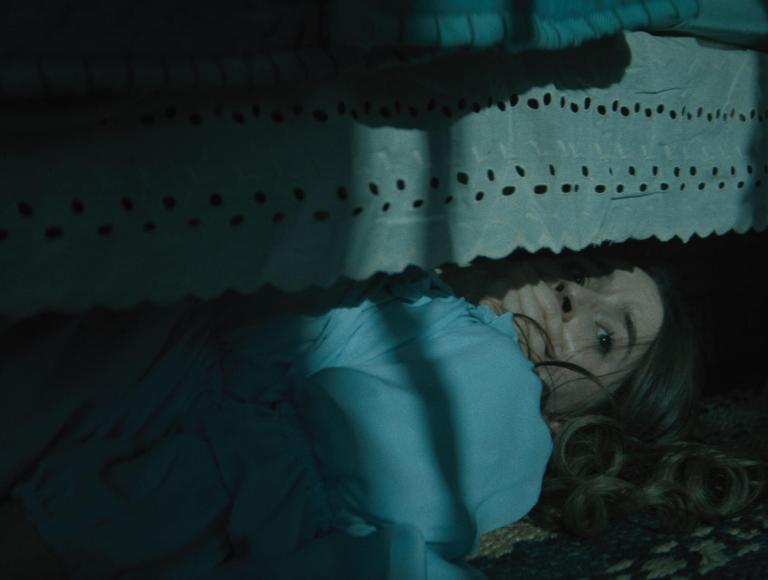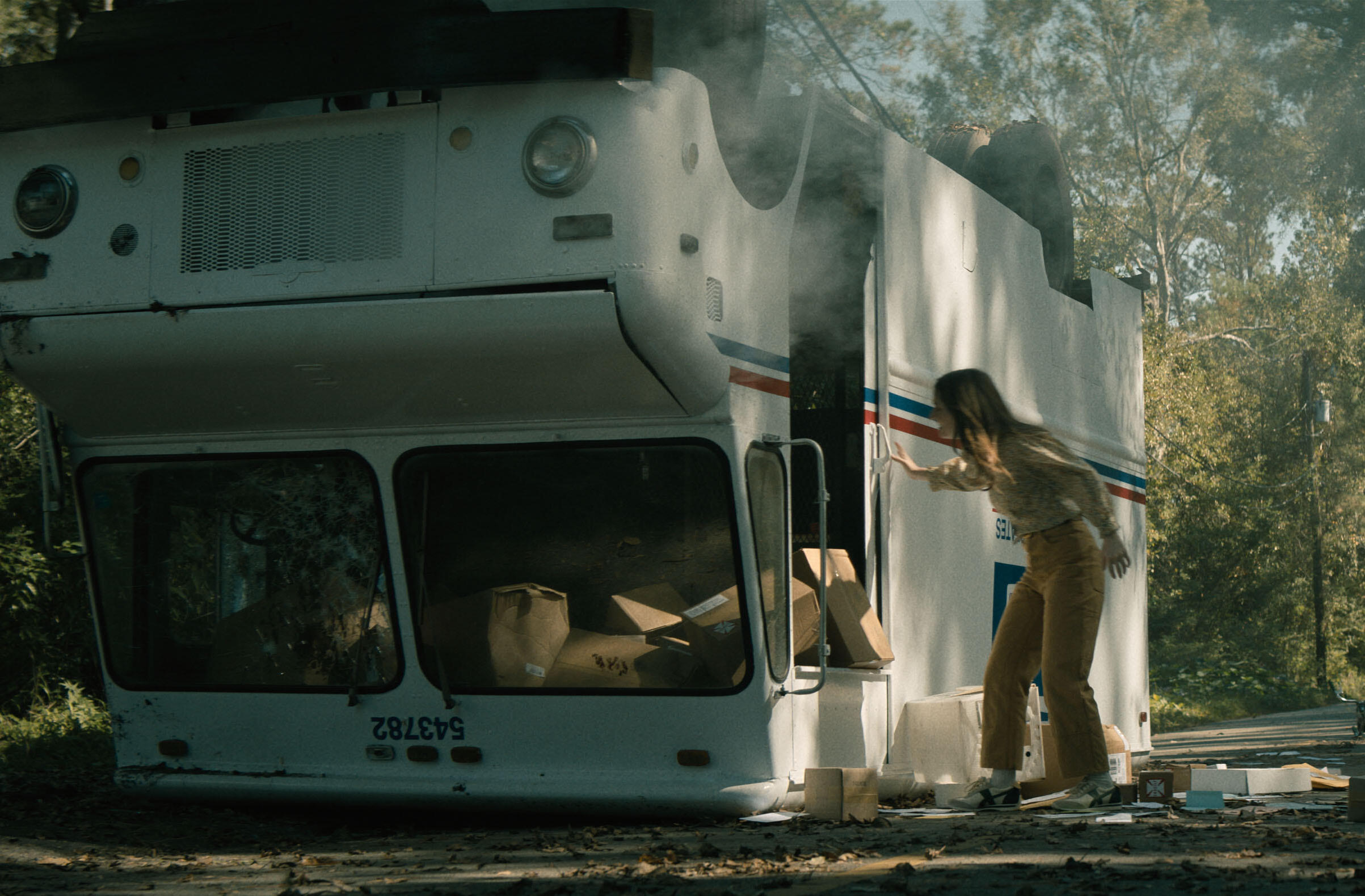How ‘No One Will Save You’ Remains Captivating in the Absence of Dialogue
‘No One Will Save You’ is a bated-breath thriller that maintains never-ending tension thanks to an incomparable Kaitlyn Dever, an ominous score, and a slowly unfurling core mystery.

The Hulu original film No One Will Save You provides 93 minutes of ceaseless bated breath via its extraterrestrial meets home invasion thriller format. Brynn (Kaitlyn Dever) lives a solitary lifestyle in a traditional (slightly antiquated) home seemingly on the outskirts of town — with a wired rotary phone on the wall. Her life is placid and unobstructed by social interactions until an alien— with a skeletal body featuring protruding ribs, an oversized oval-shaped head, elongated and inhumanly dexterous fingers, and semi-iridescent, reflective cosmic black eyes — breaks into her home.
Brynn must fight for her life against an invasion that she soon comes to discover extends far beyond the confines of her dwelling. Despite a near-total absence of dialogue — sans squeals, tears, and agonizing screams — the film manages to maintain captivation from start to finish, as Brynn fights to survive while a tragic and traumatic past bubbles beneath the surface.
Dever is significantly responsible for gripping the viewer, pulling us into her quickly-shifting emotional states via facial expression and breath work alone. If there was an award for breath-acting, Dever would win it. From the self-soothing inhalations — to calm herself in ever-so-fleeting moments of reprieve — to the exhausted exhalations that indicate shock at survival and physical degradation, her battle for existence is palpable. Her tension, her activated flight-or-fight response, oozes from the screen, transferring seamlessly to the viewer via her near-inaudible gasps in response to creaking floorboards and foreboding footsteps. Her fear-struck double inhalations — drawing breath she cannot physically release until the threat is neutralized — stir suspense and creaate compassion at once.
Alongside her masterclass in frightened breathwork, Dever’s expressions transform ever-so-subtly. Nuanced lip movements that shift from closed-mouth determination to open-mounted anticipation indicate her alternating mental states. Widened eyes give way to watery ones as the tragedy of her past lingers beneath the surface. She carries this film without uttering a single word. Darting eyes, a survival instinct that lends way to murderous impulse, and a traumatic past that overlays her performance with a sense of regret and shame keep us locked in. Yet, Dever is not alone in building this anxiety-ridden atmosphere.
No One Will Save You features a palpitation-inducing score by Joseph Traponese (Oblivion, Straight Outta Compton, The Witcher, Shadow and Bone, To What Remains), which augments Dever’s performance, paralleling her moments of clear-sighted resolve with quick-tempo bowing of the violin or highlighting her fear and doubts via ominous electronic bellows. He mixes classic orchestral sounds with more contemporary electronic whooshes and percussions to create a score that feels grounded in reality and reverential to old-school invasion slashers (complementing the desolate cabin aura), yet also beyond this world (relaying the very unearthly threat at play).

Yet, it is the alien’s warbling, guttural clicking, and bone-crackling (as they contort their bodies into haunting, yet sort of yoga-esque, positions) that settle and stir in the pit of your stomach. Their articulations— when the extra-terrestrials are speaking to one another — are somehow word-like yet also so far from any human-sounding language. It’s nothing less than genius. The aliens, when out of sight, are an auditory anticipation-building device, which maintains tension. Yet, when they do appear, they’re blood-curdling.
Their bodies are nightmare fuel. They walk with an undaunted sense of omniscience. They stand ominous and foreboding. Yet, when they move, it’s fast and spider-like. However, the aliens are not only a threat physically, as they possess telekinetic abilities. Thus, Brynn and the viewers at home never know how an attack will manifest. Will a door come flying at her? Will the knife in her hand slip from her grip? Or, will the alien simply jump onto her body, defying the laws of physics as he hurdles himself at her head?
The mix of telekinetic threats with more tangible, classic creature-feature-type attacks makes for unceasing unpredictability. Even when the alien is not physically in sight, Brynn is in danger — her own house and her very belongings become no more than gravity-defying weaponry for the advanced species to control. They can glue her body to the ceiling without touching her, or, they can hold her down with their creepy crawly fingers. Bringing the sci-fi aspect — via superpowered (for lack of a better term) aliens — into the home invasion space makes for a horror movie that boasts the benefit of threats often reserved for the paranormal plus those akin to the monster film.
And, when we’re not clutching our couch cushions, pulling the dog in closer, or slowly biting down on the popcorn so as to not disrupt the brilliant score, we’re trying to piece together a mystery that doesn’t unfold until the closing moments. Why is Brynn all alone in the first place? Why does she visit a gravesite mid-film? Why does a woman who seems to know her spit in her face? Who is she writing letters, strung with apologetic declarations, to? What has she done? What is so unforgivable that she has abandoned her community? What mentally stable human chooses such extreme isolation? With hints scattered throughout, the 93-minute, adrenaline-spiking ride is a commanding and taut thriller that boasts a clear narrative throughline and brings quite the imaginative execution to the over-loaded invasion space.
